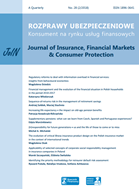Orzecznictwo Sądu Najwyższego w sprawie kredytów waloryzowanych kursem waluty obcej a prawidłowa implementacja jurysdykcyjna dyrektywy 93/13/EWG
The Polish Supreme Court's case-law in cases concerning loans indexed with the exchange rate of a foreign currency and the correct judicial implementation of Directive 93/13/EEC
Author(s): Dawid RogozińskiSubject(s): Civil Law, Financial Markets
Published by: Rzecznik Finansowy / Fundacja Edukacji Ubezpieczeniowej
Keywords: abusive clauses; consumer protection on the financial market; credit exposure; credit risk; currency-denominated credit; valorisation of debt
Summary/Abstract: Problem kredytów waloryzowanych kursem waluty obcej doczekał się uwagi sądów: na szczeblu krajowym – kilku wyroków Sądu Najwyższego, a na szczeblu unijnym – orzeczeń Trybunału Sprawiedliwości UE. Wyrok tego ostatniego w sprawie Andriciuc przeciwko Banca Românească C-186/16 powinien stać się punktem odniesienia dla prawidłowej oceny prawnej umów kredytowych przenoszących w całości ryzyko długoterminowych wahań kursów waluty obcej na kredytobiorców-konsumentów. W niniejszej pracy w syntetyczny sposób wskazano na sposób kształtowania mechanizmów indeksacyjnych i denominacyjnych w umowach kredytowych wykorzystywanych w praktyce i podkreślono najbardziej newralgiczne kwestie będące kanwą toczących się sporów sądowych. Autor, analizując dotychczasowe orzecznictwo Sądu Najwyższego w tym zakresie, stawia tezę o błędnej i niekompletnej wykładni przepisów krajowych implementujących dyrektywę 93/13/EWG w sprawie nieuczciwych warunków w umowach konsumenckich. Krytycznie ocenia przede wszystkim wyłaniające się z tych orzeczeń wnioski o dopuszczalności rozciągnięcia skutków prawnych tzw. ustawy antyspreadowej na sytuację prawną kredytobiorców, którzy zaciągnęli zobowiązania przed jej wejściem w życie, oraz zaproponowane metody usuwania skutków abuzywności kwestionowanych klauzul – sprowadzające się do ich zastępowania przepisami prawa wekslowego lub odpowiednio stosowanymi innymi nieuczciwymi warunkami umownymi. The problem of currency-denominated credit has received the attention of the judicature: at the national level – several judgments of the Polish Supreme Court, and at the EU level – judgments of the EU Court of Justice. Judgment in case C-186/16 Andriciuc (2017) should become the reference point for the correct legal assessment of credit agreements that fully transfers the risk of long-term fluctuations in exchange rates of foreign currency to consumers. The article indicates the manner of shaping such types of credit agreements in Polish practice. The most sensitive issues (some not yet recognised in case-law) related to the use of mechanisms of denomination or indexation of obligations were specified too. A thesis was made about an incorrect and incomplete interpretation (made by the Polish Supreme Court) of national provisions implementing Directive 93/13/EEC on unfair terms in consumer contracts. The most important theses emerging from the rulings of the Supreme Court were critically assessed: impact of the so-called the anti-spread law on the legal situation of borrowers and proposals for removing the consequences of the abusiveness of the provisions of the contract.
Journal: Rozprawy Ubezpieczeniowe. Konsument na rynku usług finansowych
- Issue Year: 4/2018
- Issue No: 30
- Page Range: 3-21
- Page Count: 19
- Language: Polish

